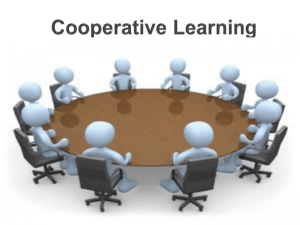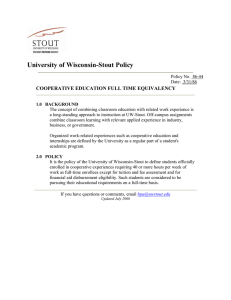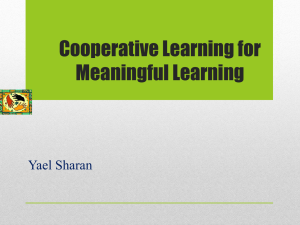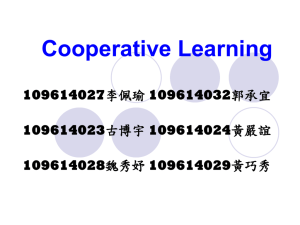Profitable Manager Evaluation
advertisement
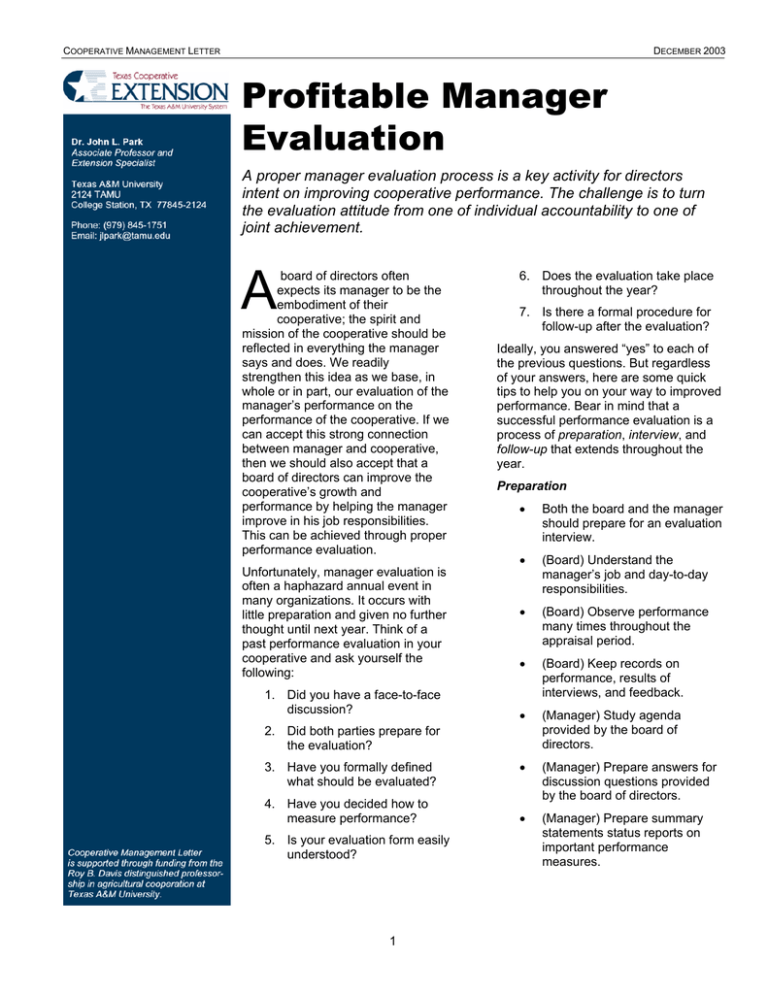
COOPERATIVE MANAGEMENT LETTER DECEMBER 2003 Profitable Manager Evaluation A proper manager evaluation process is a key activity for directors intent on improving cooperative performance. The challenge is to turn the evaluation attitude from one of individual accountability to one of joint achievement. A board of directors often expects its manager to be the embodiment of their cooperative; the spirit and mission of the cooperative should be reflected in everything the manager says and does. We readily strengthen this idea as we base, in whole or in part, our evaluation of the manager’s performance on the performance of the cooperative. If we can accept this strong connection between manager and cooperative, then we should also accept that a board of directors can improve the cooperative’s growth and performance by helping the manager improve in his job responsibilities. This can be achieved through proper performance evaluation. Unfortunately, manager evaluation is often a haphazard annual event in many organizations. It occurs with little preparation and given no further thought until next year. Think of a past performance evaluation in your cooperative and ask yourself the following: 1. Did you have a face-to-face discussion? 6. Does the evaluation take place throughout the year? 7. Is there a formal procedure for follow-up after the evaluation? Ideally, you answered “yes” to each of the previous questions. But regardless of your answers, here are some quick tips to help you on your way to improved performance. Bear in mind that a successful performance evaluation is a process of preparation, interview, and follow-up that extends throughout the year. Preparation • Both the board and the manager should prepare for an evaluation interview. • (Board) Understand the manager’s job and day-to-day responsibilities. • (Board) Observe performance many times throughout the appraisal period. • (Board) Keep records on performance, results of interviews, and feedback. • (Manager) Study agenda provided by the board of directors. • (Manager) Prepare answers for discussion questions provided by the board of directors. • (Manager) Prepare summary statements status reports on important performance measures. 2. Did both parties prepare for the evaluation? 3. Have you formally defined what should be evaluated? 4. Have you decided how to measure performance? 5. Is your evaluation form easily understood? 1 COOPERATIVE MANAGEMENT LETTER DECEMBER 2003 evaluation or judgment is based upon one’s past experience and point of view. While bias is unavoidable, knowing about your tendency toward bias can help you to control it. The Interview • Meet in the proper climate: a private, neutral location with a friendly, informal atmosphere. • Schedule time for a thorough interview with no interruptions. • Start with strengths, giving praise where praise is due. • There should be no surprises as to the agenda! Both parties should be given adequate opportunity to properly communicate their position. • Be completely honest. • Remember that bad news is another form of important feedback. • Have a two-way conversation, not a lecture, not an issue of orders. • Set personal goals for the manager with a joint plan of action. • In general, try to eliminate any personal bias from the procedure. Concentrate on behavior and not personality. For example, you will have a positive bias toward someone for whom you have a natural affection. You may tend to agree more often with this individual because he or she is similar to you in personality or appearance. This “halo effect” may actually blind you to poor decisions because of your desire to trust an individual that you like. Or, it is possible that a director and manager have similar skills and experiences that result in a shared blind spot in their decision making. A formal, established procedure for performance evaluation and development will help to combat these forms of bias. Expectations and Feedback Properly communicated expectations and feedback are essential to making the evaluation process a profitable one. Without proper these the evaluation experience becomes little more than an expense for corporate accountability. Unfortunately this requires effort and planning. Poorly defined expectations are like a man who is blindfolded and asked to throw a ball through a hoop. The man throws the ball to where he believes is the location of the hoop. Somehow he succeeds in his task, but the only feedback is a pat on the back and a warm handshake. When we fail to define indicators of performance and how they will be measured, we are asking managers to shoot blind. Further, giving infrequent feedback that is limited to words of scorn or praise will never increase the likelihood of improved performance. Follow-Up • Immediately record everything that was discussed and decided. A copy of this record should be given to the manager. • Evaluate the evaluation and make adjustments for next time. • Have an established plan for motivating and rewarding the manager for improved performance. • Provide timely feedback and re-evaluate goals at predetermined times. • Give visible praise (in front of the community, employees, and members). Although performance evaluation is rarely a task that is eagerly anticipated, it can become a valued and rewarding process. All organizations can benefit from proper performance evaluation. Those who have struggled to maintain a strong managerial presence will benefit from longer periods of growth and focused strategy. Even organizations satisfied with the quality of their management can benefit by replacing an annual pat on the back with an aggressive commitment to year-round goal achievement. Bias is Inevitable There isn’t a question as to whether or not you will be biased in your interview. The very nature of making an Educational programs of Texas Cooperative Extension are open to all people without regard to race, color, sex, disability, religion, age or national origin. Issued in furtherance of Cooperative Extension Work in Agriculture and Home Economics, Acts of Congress of May 8, 1914, as amended, and June 30, 1914, in cooperation with the United States Department of Agriculture, Chester P. Fehlis, Deputy Director, Texas Cooperative Extension, The Texas A&M University System. 2

